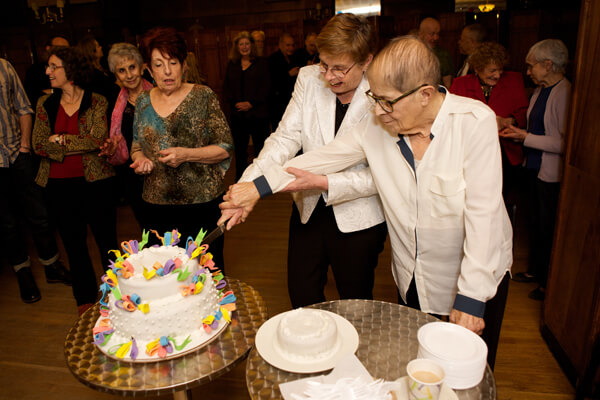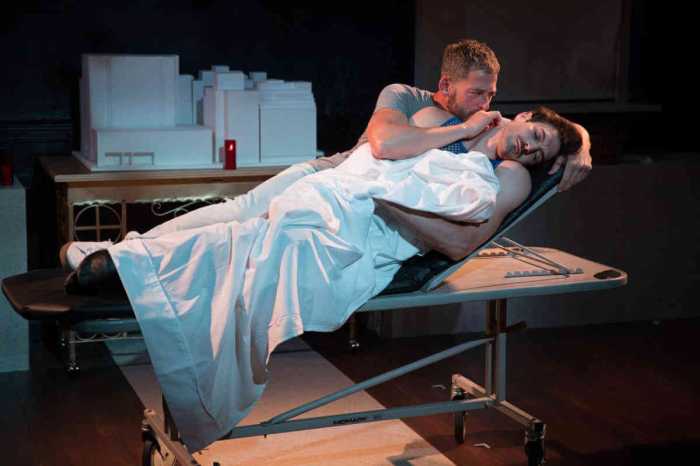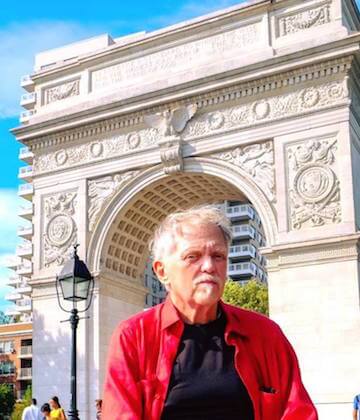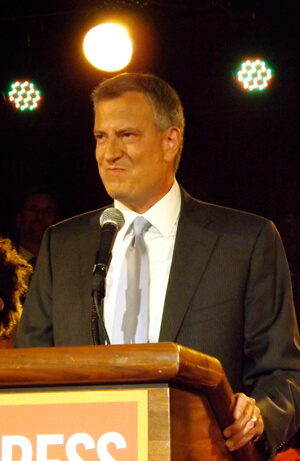F rom the moment they met at Chelsea’s old French Hospital, 46 years went by before Lee Zevy and Lucy Ianniciello finally got married this past October. For much of that time, the two women were making an indelible mark on the city by helping to found and sustain Identity House, its oldest continuously operating, all-volunteer LGBT organization.
The year was 1967, and Zevy, a 25-year-old from the Bronx, had recently finished college and was working as a secretary at the West 30th Street hospital — a position she gained through her mother, who’d been on staff there for some time. Queens-born Ianniciello, 37 at the time, had by then worked her way up the ranks to lead the hospital’s nuclear medicine laboratory. And one day, Zevy’s mother introduced them to each other, quickly igniting a spark that has never gone out.
“We still don’t know if my mother knew exactly what was going on,” said Zevy, 72, with a laugh, sitting next to her wife, now 84, in their longtime home on West 17th Street. “But she definitely set us up, and my mother was a party girl from Brooklyn, so she probably had some idea.”
Lee Zevy and Lucy Ianniciello, married after 46 years, devoted decades to building Identity House
One thing that was never in doubt was the connection between the two women, which cut through the forced secrecy and pervasive prejudice of the day.
“I just started flirting, and she didn’t know what hit her,” said Zevy, flashing another smile.
Ianniciello had a house upstate in Peekskill at that time, and within a year Zevy took the leap and moved in with her. They both commuted into the city — Ianniciello remaining at her hospital post and Zevy beginning her career in earnest as a caseworker for the Department of Social Services.
It was during her time at the city agency that, in 1971, Zevy and a male co-worker decided to come out to each other.
“Even that was dangerous back then,” said Ianniciello.
But the experience had a deep effect on Zevy — who would soon go back to school to get a master’s degree in social work — and made her want to help other closeted men and women who were in personal crisis. She learned more about how counseling, originally through phone hotlines, was helping struggling gays and lesbians, and she heard about people working to create new walk-in counseling centers at which otherwise frightened people could share their feelings and their stories with trained peers.
Psychotherapist Ralph Blair had already founded the Homosexual Community Counseling Center, the first of its kind in New York, which was run in a clinical setting, not based on peer counseling. Therapist and gay activist Charles Silverstein — Chuck, as Zevy calls him — worked for Blair at that group, but later changed course.
“Ralph was kind of autocratic, so Chuck eventually split with him,” said Zevy. “And then Chuck got together this group of humanistic and gestalt therapists, with the idea of setting up a new, different organization to counsel gays and lesbians.”
Zevy was there for the first meeting, alongside Silverstein, to establish what would become the revolutionary organization called Identity House. Initial planning sessions took place late in 1971 and into 1972 at the West 16th Street office of gay therapist Patrick Kelley. Overseen by licensed therapists, the new group would allow gays and lesbians to counsel their peers in a more intimate, non-medical setting.
While continuing her own job, Zevy volunteered as one of the first counselors, and Ianniciello took some time away from her medical career to do much-needed administrative work for the group. In its early years, Identity House was somewhat nomadic, holding walk-in sessions in the basement of the Church of the Holy Apostles, at the corner of West 28th Street and Ninth Avenue, and later back in Kelley’s office.
“These people had never actually talked to anyone about being gay before, and they’d walk up and down the stairs, up and down, before getting the courage to come up to the office and talk,” Zevy recalled of those early years at Kelley’s office. “And after having the one-on-one counseling, we also started men’s and women’s groups, where they could talk to each other about what it meant to be gay, about going to the bar or dating, and really about any topics they wanted to discuss.”
Attendees talked not only about their emotional struggles, but also at times about the scars of physical attacks they had suffered.
“People changed after their very first meeting,” said Zevy. “They gained self-esteem, optimism, hope. They learned about each other and formed their own friendship groups. It was everything we wanted.”
But by the end of 1973, Silverstein, in pressing for therapists to take charge at Identity House, replacing the peer counselors, set in motion an organizational schism. Though Zevy was on her way to becoming a licensed psychotherapist herself, she and others resisted.
“It was a major split, a huge conflict,” she explained. “He basically wanted to exclude the peers from doing counseling, but there was this revolution in response, because those of us who were not yet therapists wanted to keep doing what we were doing, since it was so successful and the clients didn’t want it to change.”
Silverstein ended up leaving, and put his ideas to work by founding the Institute for Human Identity, a non-profit psychotherapy center that, to this day, remains based near the corner of West 26th Street and Eighth Avenue. His effort to take the name Identity House with him, Zevy explained, was thwarted by Sidney Abbott and Barbara Love — feminist co-authors of the 1972 book “Sappho Was a Right-On Woman: A Liberated View of Lesbianism” — who “drove right up to Albany to make sure we could reserve the name, before Chuck could take it.”
When Identity House moved to second floor offices on Sixth Avenue, between West 14th and 15th Streets, the larger space allowed the group to expand its programming to include workshops, conferences, and parties. “The value of those parties was that they weren’t the bars, which had really been the only places to meet other gay people at that point,” said Zevy. “We wanted to provide a more neutral, non-alcoholic setting for people.”
As AIDS emerged in the early 1980s, Identity House worked closely with groups like the newly formed Gay Men’s Health Crisis and the staff of the former St. Vincent’s Hospital to deal with new sources of fear — even as close comrades fell victim. One particularly deep blow to the organization was Kelley’s death.
“It was a horrible death,” said Ianniciello. “Pat was so sick that the doctors could guess it was HIV, but nobody really knew what it was.”
Some of those in the Identity House family lost to AIDS provided endowments that continue to support the organization’s efforts to this day.
From the late ‘90s until 2006, the group occupied space on West 14th Street, between Fifth and Sixth Avenues, until a massive rent increase occasioned a move to the LGBT Community Center on West 13th Street. Identity House remains there, though for the past two years it has also maintained space at the Washington Square Institute, another nonprofit based near the corner of East 11th Street and University Place.
Ianniciello retired from her medical career in the late 1990s when she was in her late 60s, and also gave up her administrative responsibilities at Identity House. Zevy remains the group’s supervising therapist, continues her private practice, and serves as president of the New York Institute of Gestalt Therapy. Identity House holds two nights of counseling per week at both the LGBT Center and Washington Square Institute, and also hosts other related workshops and programming.
The couple’s decision to marry took some time to work out after New York’s enactment of marriage equality in 2011. “We didn’t see any point in doing it,” said Zevy. “We’d never wanted to get married, since neither of us was particularly enamored with the whole idea of it.”
However, when Ianniciello suffered a heart attack last July and was hospitalized for two months, practical concerns surfaced. The experience involved a lot of paperwork headaches made much more difficult by their lack of any legal relationship to each other.
So, in decidedly low-key fashion, the two women exchanged vows in a ceremony at the city clerk’s office on October 23. But they also had a party to celebrate — in December. “What we never realized until the party was that a lot of people we know were holding their breath, waiting for us to finally get married,” said Zevy, with a laugh.
With decades of peer counseling behind her, Zevy is happy that younger counselors have stepped up to grab the reins of program design at Identity House. She acknowledged that they bring fresh ideas to bear, particularly regarding the needs of the transgender community and the goal of integrating gay men, lesbians, and trans folks into the same group sessions.
“The truth is that this isn’t our world anymore,” said Zevy, looking over at her wife. “Lucy and I are dinosaurs compared to where the kids are at, especially when it comes to using the new technology. Things don’t matter to our community’s young people in the same ways they mattered to us back then because they have access to information and connection in a way that’s totally foreign to us. So the young people are going to create things that are totally foreign to us, but as long as they still know the history, that’s okay.”
But some things never really change, and Zevy emphasized that the direct connection of peer counseling — the in-person, conversational, and deeply personal element that can sometimes be forgotten in a digital age — still has the same effect it did more than four decades ago.
“A lot of these young people come to us and they want to be counselors, and they’re often very accomplished because they’ve been driving themselves to work hard in school or to build their careers,” said Zevy. “But before an orientation, before we train them at all, we ask them how they feel. And it’s still a sort of revolutionary thing, because you see that the young people are starved for the connectedness, for the humanity.
“This is what makes our organization function,” she explained. “At school or at work, people are worried about completing tasks, but here, we’re worried about how you feel. So, yes, a lot of our peers have, and will, go on to become therapists, psychiatrists, or lawyers — but now they really have a heart. We send them off with a heart.”




































